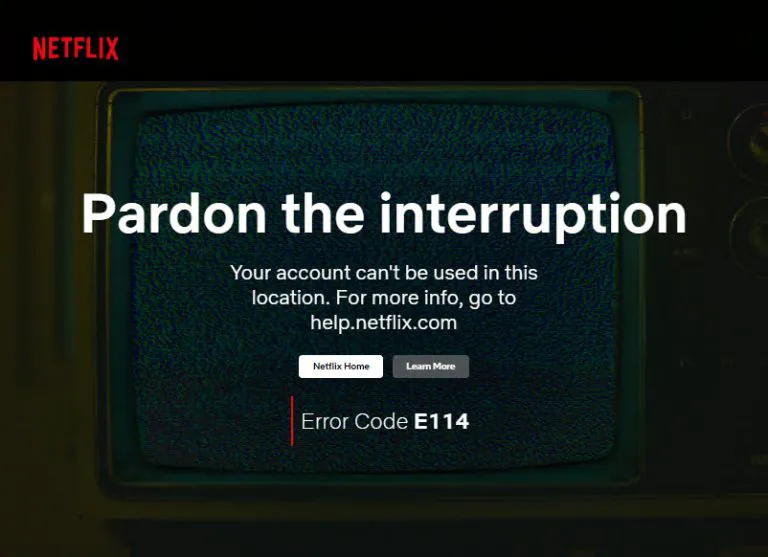Can You Really Opt Out from People Search Sites?

As of now, over 550 data brokers are registered in California[1]. People search sites, also known as people finder websites, are a type of data broker that specialize in providing easy access to personal information about individuals.
While these sites can help reconnect with old friends and family, they also raise significant privacy concerns by exposing personal details like phone numbers and addresses. Fortunately, most sites offer an opt-out option. But can you really opt out from people search sites?
The reality of opting out
To be honest, opting out of people search sites is possible but comes with limitations:
Impermanence and incompleteness
- Temporary
Making yourself invisible on people search sites may only temporarily hide your information, as it can reappear after a certain period, requiring you to repeat the action.
Abine, a leader in online privacy solutions, has verified that consumers using BeenVerified’s opt-out system often find their information reappearing in its search results, sometimes even including updated details provided during the opt-out process[2]. Similarly, Spokeo states on its opt-out page that “Your information may reappear on Spokeo in the future without notice.”
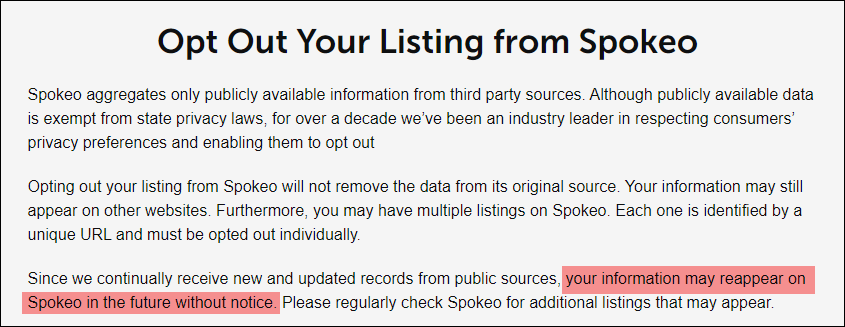
This occurs because people search sites continually receive new and updated records from public sources. When they obtain your information again, it may be added back to their databases. Therefore, to maintain your privacy, you need to regularly repeat the removal process to prevent your information from resurfacing.
- Partial
Opting out from people search sites doesn’t remove your data from the original public sources. These sites compile information from publicly accessible records like property records, court records, and social media, which they have no authority to erase records from.
Read more: Sources of Data: Where do people search sites get their data
Legal rights and changes
While the U.S. lacks a federal law governing people search services, several states are addressing this issue. For instance, the 2018 California Consumer Privacy Act (CCPA) grants residents rights over their personal information, including the right to access, delete, and opt out. Data brokers in California must comply with these regulations, or you can file a complaint with the Federal Trade Commission (FTC).
By 2026, the California Privacy Protection Agency (CPPA) will provide a single-request deletion method through the California Delete Act, simplifying the process.
Read more: Are people search sites legit?
How to opt out from people search sites?
Three approaches are available to process a removal on people search sites: opting out by yourself, using a paid service, and hiring a lawyer.
1. Opt out by yourself
This method is free but time-consuming and tedious. You’ll need to visit each people search site, find the opt-out page, and follow their specific procedures. Some tips:

- Create a new email address that is not associated with your real identity to avoid providing more information to these sites. Some people search sites send emails for confirmation, and you need to click the link inside to continue.
- Blackout sensitive information. When submitting ID verification (e.g. driver’s card), use a photo editor to blackout unnecessary details like your photo or license number.
- Track your requests. Keep a record of your opt-out requests and review them periodically.
- Some people search sites require you to send a fax to process your removal request, a tactic that can deter many users due to the inconvenience of faxing. However, if you need to send a fax, MyFax offers a monthly plan for $12, allowing you to send up to 100 pages. Additionally, if you’re not satisfied with the service, you can cancel at any time.
The process of opting out can be divided into four general steps.
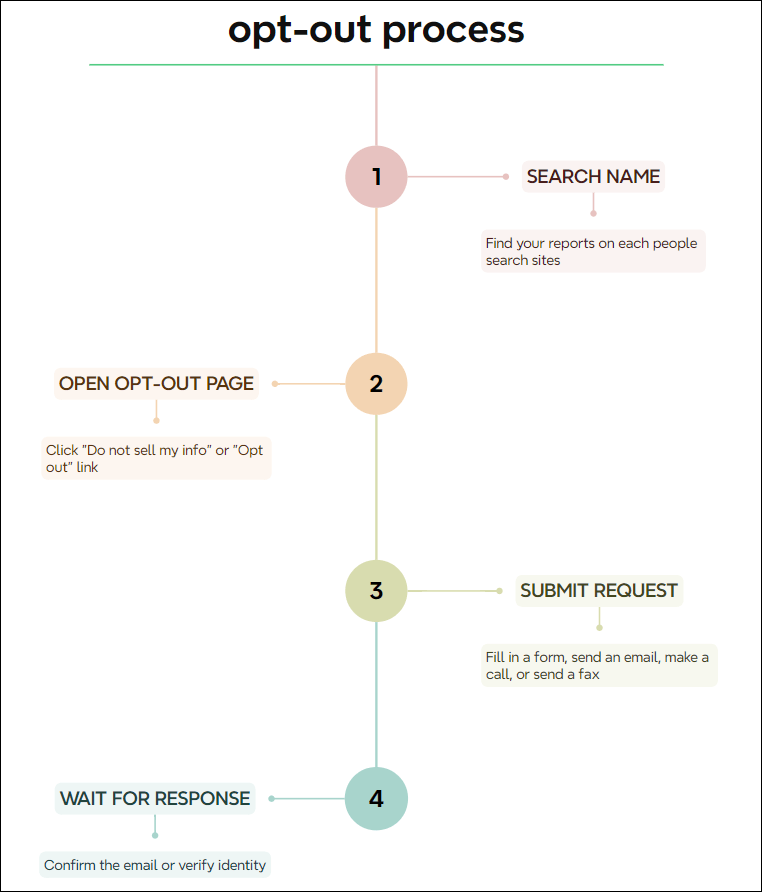
Start with searching your name on people search sites and locating your report. Be prepared for this step to take some time, as results may take a while to load. Once you find your report(s), copy the links. Note that you might have multiple reports on the same site.
Secondly, navigate to the bottom of the site’s homepage to locate the opt-out page, often labeled “Do not sell my info” or “Opt out.”
Next, follow the instructions to submit your opt-out request. This might involve filling out a form on the website, sending an email, making a phone call, or sending a fax. Be prepared to verify your identity, but be cautious not to provide extra information that could be added to their database.
Finally, wait for the response. You may need to confirm your opt-out request via email, so check your inbox regularly. Once you receive confirmation, search for your name again to ensure the removal was successful. Repeat this process for other people search sites.
If you’re still confused about the process, here we take Spokeo as an example:
- Search your name on Spokeo and filter the results by age, state, city, phone number, and more. Right-click your report and select Copy link address.
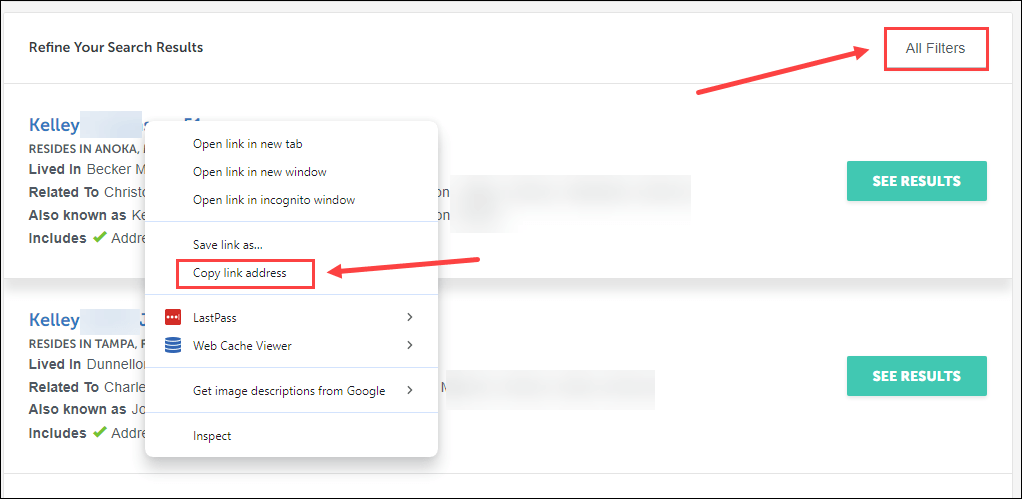
- Go to https://www.spokeo.com/optout.
- Scroll down, paste the link in the URL, fill in your Email Address, tick I’m not a robot, and click OPT OUT. If you have multiple reports on Spokeo, you need to submit them individually.
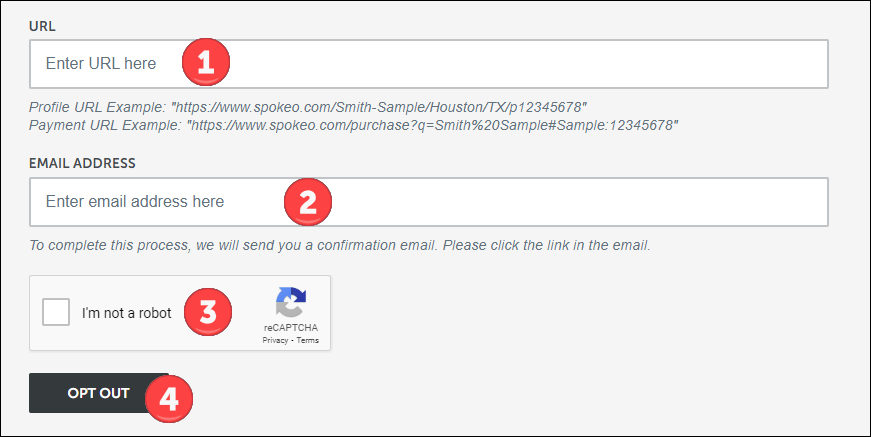
- Check your email inbox and click the link in the email sent by Spokeo.
Here we provide some popular people search sites’ opt-out links:
- BeenVerified: https://www.beenverified.com/app/optout/search
- TruthFinder: https://suppression.peopleconnect.us
- Intelius: https://suppression.peopleconnect.us
- Instant Checkmate: https://suppression.peopleconnect.us
- FastPeopleSearch: https://www.fastpeoplesearch.com/removal
- PeekYou: https://www.peekyou.com/about/contact/optout
- PeopleFinders: https://www.peoplefinders.com/opt-out
- Pipl: https://pipl.com/personal-information-removal-request
You may have noticed that TruthFinder, Intelius, and Instant Checkmate share the same opt-out page, that’s because they all belong to the same company PeopleConnect. In fact, it also owns Addresses.com, Addresssearch.com, Anywho, Classmates, DateCheck, InstantPeopleFinder, iSearch, LookUpAnyone, Peopleconnect.us, PeopleFinder, PeopleLookup, Phonesbook, Publicrecords, Spock, US Search, and Zabasearch. So start the removal process with big websites, and it may save you great effort.
Some privacy advocates have summed up data broker opt-out lists. We attach them below for your reference:
- https://github.com/yaelwrites/Big-Ass-Data-Broker-Opt-Out-List
- https://inteltechniques.com/data/workbook.pdf
2. Use a paid service
If you don’t want to spend a lot of time and energy opting out of each website individually, you can pay for a service to handle the process for you.
Before subscribing to such a service, consider the following points:
- Coverage: Most service providers offer a list of sites they cover for information removal. Check if the sites where your information is listed are included in their coverage.
- Monitoring: Some services provide regular reports to help you monitor your online information. This can be beneficial for keeping track of your data’s status.
Many websites also offer a free scan service or a free trial when you sign up for an account. They employ various methods to remove your information. For example, DeleteMe protects its customers’ information by submitting removal requests on behalf of consumers[3].
Here are some popular websites offering deletion services:
- DeleteMe
- Kanary
- OneRep
- Removaly
- PrivacyDuck
By using these services, you can delegate the tedious task of data removal and benefit from ongoing monitoring and protection.
3. Hire a lawyer
If some people search sites don’t offer opt-out options or if paid services fail to cover these sites, you can hire a lawyer to tackle this issue.
Internet privacy attorneys can outperform protection services by providing tailored protection to suit your specific needs. They understand the legal framework, offer legal advice and protection, and can navigate the opt-out process more efficiently.
However, hiring a lawyer can be expensive. For instance, a Redditor in Texas spent $800 to pay a lawyer for this job[4]. Therefore, it’s important to weigh the costs against the benefits before deciding on this option.
Why do people search sites accept removal requests?
Back in 2011, the FTC tried to ensure that data brokers respect consumer’s choices. It took action against US Search, a people search site, which allowed consumers to opt out for a fee of $10. Despite 4,000 consumers paying the fee, their personal information continued to appear in search results[5]. The FTC required US Search to disclose the limitations of its opt-out offer and refund affected consumers.
By 2024, 15 states in the United States had enacted various data privacy laws to regulate data brokers. Specifically, the California Privacy Rights Act (CPRA) allows consumers to prevent businesses from sharing their personal data and limits the use of “sensitive personal information.” It’s a must for people search sites to comply with these laws to avoid legal penalties.
Apart from legal compliance, other aspects suggest that people search sites respect user privacy.
By allowing opt-out requests, these sites show a commitment to respecting users’ privacy and addressing concerns about data misuse. It helps build trust with the public and improve the site’s reputation, even if the primary business model involves making personal information accessible.
Besides, the opt-out option sometimes helps improve data accuracy. When users upload their personal information to validate their identity during the opt-out process, it can help the site correct or remove outdated or incorrect data. These are all crucial factors driving people search sites to offer opt-out options.
Why do people opt out from people search sites?
People want to hide their information from people search sites for various reasons, primarily related to protection and privacy.
One critical reason is protection from physical harm. In 1999, the investigation firm Docusearch provided information to a man who used it to track down a woman and fatally shoot her[6]. If a malicious stalker obtains your current address through these sites, it can pose a significant risk to your safety.
To continue, removing your data from people search sites reduces the risk of becoming a victim of cybercrimes. In 2023, the data privacy tool Incogni, powered by Surfshark, reported that 23 of 506 registered US-based data brokers had suffered data breaches, exposing nearly 210 million American records[7]. Misused data can lead to online impersonation, financial loss, and other severe consequences.
What’s more, it’s crucial to maintain your online reputation, as people search sites may provide incorrect or outdated information. To give you an idea, in 2014, a complaint revealed that InfoTrack provided inaccurate information suggesting that job applicants were potentially registered sex offenders, which could cause employers to reject their applications[8]. Although people search sites are no longer allowed to provide background check reports for employment purposes under the Fair Credit Reporting Act (FCRA), managing your online presence remains essential to protecting your reputation.
The future of opting-out
If you find opting out methods above tedious, time-consuming and expensive, don’t worry.
In 2023, the CPPA approved the California Delete Act which promises to simplify the opt-out process. It grants its residents rights to know, control, delete, correct, and opt out from data brokers. More importantly, by 2026, the CPPA will establish a free, simple mechanism for consumers to delete their personal data with a single request[9]. Once consumers request deletion, data brokers are barred from selling or sharing their data unless the consumers explicitly opt in for it.
Conclusion
Opting out from people search sites is a challenging but important step in protecting your privacy. While the process can be tedious and not entirely permanent, it significantly reduces your exposure to potential risks. With upcoming legal changes, the future looks promising for more effective and simplified privacy protection.
Image credit:
Mail icons created by graphicmall – Flaticon
Business card icons created by Freepik – Flaticon
Pros and cons icons created by wanicon – Flaticon
Fax icons created by Vectors Tank – Flaticon
Unsubscribe icons created by bearicons – Flaticon
References:
- State of California Department of Justice. Data Broker Registry. https://oag.ca.gov/data-brokers↩
- PR Newswire. (2012, February 13). FTC Complaint Filed Against Data Broker BeenVerified Leads to Discussion About Consumer Online Privacy. https://www.prnewswire.com/news-releases/ftc-complaint-filed-against-data-broker-beenverified-leads-to-discussion-about-consumer-online-privacy-139214134.html↩
- PR Newswire. (2012, February 13). FTC Complaint Filed Against Data Broker BeenVerified Leads to Discussion About Consumer Online Privacy. https://www.prnewswire.com/news-releases/ftc-complaint-filed-against-data-broker-beenverified-leads-to-discussion-about-consumer-online-privacy-139214134.html↩
- r/technology. [Caticorn]. (2011, July 29). HOW TO: Remove yourself from ALL background check websites. Thanks to LawyerCT. [Online forum post]. Reddit. https://www.reddit.com/r/technology/comments/j1mit/comment/c28l9up/?utm_source=share&utm_medium=web3x&utm_name=web3xcss&utm_term=1&utm_content=share_button↩
- Federal Trade Commission. (2011). Privacy and Data Security: Protecting Consumers in the Modern World. https://www.ftc.gov/sites/default/files/documents/public_statements/prepared-statement-federal-trade-commission-privacy-and-data-security-protecting-consumers-modern/110629privacytestimonybrill.pdf↩
- Electronic Privacy Information Center. (2006, June 15). The Amy Boyer Case. EPIC. https://archive.epic.org/privacy/boyer/↩
- Jurgita, L. (2023, February 14). +200m American records compromised in top data broker breaches. CyberNews. https://cybernews.com/privacy/top-data-broker-breaches/↩
- Federal Trade Commission. (2014). Two Data Brokers Settle FTC Charges That They Sold Consumer Data Without Complying With Protections Required Under the Fair Credit Reporting Act. https://www.ftc.gov/news-events/news/press-releases/2014/04/two-data-brokers-settle-ftc-charges-they-sold-consumer-data-without-complying-protections-required↩
- California Privacy Protection Agency. (2023, October 11). CPPA Applauds Governor Newsom for Approving the California Delete Act. https://cppa.ca.gov/announcements/2023/20231011.html↩

 View all of Yuki Huang's posts.
View all of Yuki Huang's posts.


